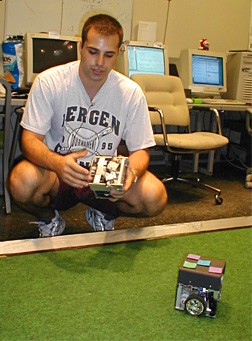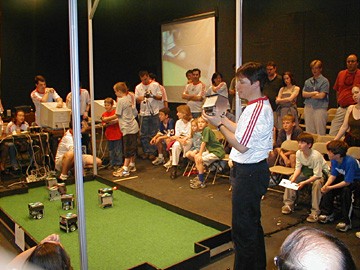Big Red team ready to defend world title at RoboCup 2000 in Australia with improved soccer-playing robots
By Bill Steele
Brimming with confidence and armed with improved versions of last year's winning robots, eight Cornell University students left today (Aug. 23), for Australia, where the Big Red team will defend its title in the fourth annual World Cup of robotic soccer, known as RoboCup. The competition runs from Aug. 26 through Sept. 3 in Melbourne.
At last year's competition in Stockholm, Sweden, the first time a Cornell team had entered, Big Red's robots easily walked — or rolled — away with the championship in the "small robots" league.
Team members traveling to Melbourne for this year's competition are master of engineering candidates Mark Schwager '00, Tobias Welge-Luessen '00, Bryan Audiffred '00, Saeed Saeed '00 and Nicole Schlegel '00, and undergraduates Will Stokes '02, Michael Babish '01 and Josh Pollak '99.
"I think our chances this year are very good," says Raffaello D'Andrea, Cornell assistant professor of mechanical and aerospace engineering and adviser to the team. "I believe we won last year because our team included mechanical and electrical engineers as well as computer scientists, where most other teams are just from computer science departments."
The robotic soccer competition was created to foster development of robotics and artificial intelligence (AI). Teams of robots compete entirely under computer control, with no human intervention during the game. The technology used has many potential practical applications, including the use of robots in search and rescue. This year's competition is held simultaneously with the Sixth Annual Pacific Rim Conference on Artificial Intelligence. In the RoboCup small robots league, teams of up to five robots, each about the size of a cookie jar, maneuver a golf ball around a field the size of a regulation table-tennis table, playing under rules very similar to regular soccer. Video cameras mounted above the field supply pictures from which a computer vision system determines the locations of the ball and players; an AI program then decides on strategy and sends commands to the robots by radio or, in the case of Cornell's new design, by infrared signals.
In addition to installing the faster infrared signaling system, the Cornell students have replaced their robots' wheels with a three-point roller system that allows the "players" to scuttle in any direction without turning. The system also includes a mechanism that lets a robot "dribble" the ball down the field, effectively keeping it out of reach of opposing players.
This year, 23 teams will compete in the small robots league, including teams from Yale and Carnegie-Mellon universities in the United States, and from universities in Australia, New Zealand, China, Japan, Germany, Denmark, South Korea, Belgium and Spain. Other leagues in the competition feature larger rolling robots, four-legged walking robots and games played entirely in simulation. New biped robots will be demonstrated this year. They are not ready for competition, but the stated goal of the RoboCup community is to have robots that can play against a human team by the year 2050.
At Cornell, development of robots for the competition is a credit course in the College of Engineering. In addition to those traveling to Melbourne, students who have been working since early fall 1999 on design and construction of the robots include undergraduates Janjarat (Nok) Onlamai '00, Thibet Rungrotkitiyot and Ph.D. candidates Tama's Kalma'r-Nagy and Pritam Ganguly.
The rest of the Robocup '00 team, all members of the class of 2000, are: Michael A Sherback, Abraham Heifets, Amanda Waack, Xiaozheng Zhong, Chin Hong Tong, Yin (Sandra) Yu, Eugene Foo, Emily Winston, Matthew Connolly, Christopher Crockett, Mikhail Falkovich, Nan Kong, Abhishek Uppal, Yuan-Luen (Luke) Chuang, Kevin Scharpenberg and Alison Sheets.
Media Contact
Get Cornell news delivered right to your inbox.
Subscribe

